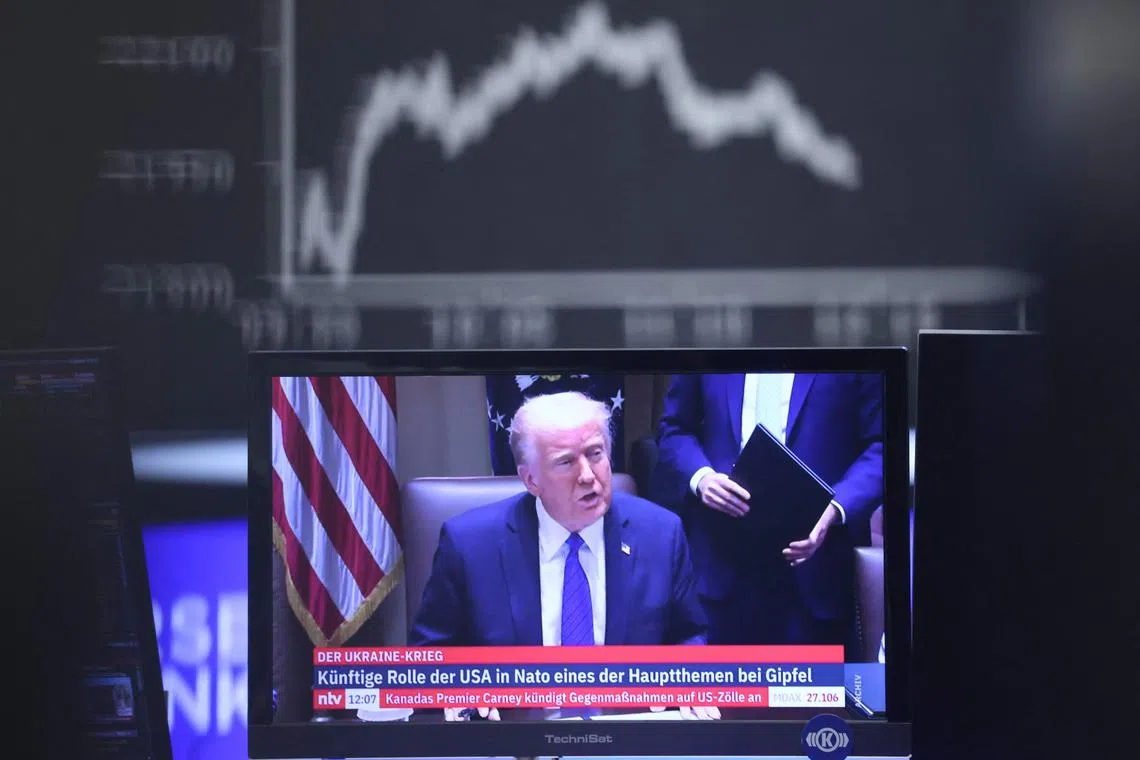Trump tariffs sow fears of trade wars, recession and a $3,000 iPhone
Sign up now: Get ST's newsletters delivered to your inbox

The tariffs announced by US President Donald Trump triggered a plunge in world financial markets and drew condemnation from other leaders.
PHOTO: AFP
Follow topic:
WASHINGTON/OTTAWA/TOKYO - Countries around the world threatened to wage a trade war with the US as President Donald Trump’s sweeping tariffs
The penalties announced by Mr Trump on April 2 triggered a plunge in world financial markets and drew condemnation from other leaders reckoning with the end of a decades-long era of trade liberalisation.
In Japan, one of US’ top trading partners, Prime Minister Shigeru Ishiba said that the tariffs had created a “national crisis” as a plunge in banking shares on April 4 set Tokyo’s stock market on course for its worst week in years.
Investment bank JPMorgan said it now sees a 60 per cent chance of the global economy entering recession by year-end, up from 40 per cent previously.
But there were conflicting messages from the White House about whether the tariffs were meant to be permanent or were a tactic to win concessions, with Mr Trump saying they “give us great power to negotiate”.
The US tariffs would amount to the highest trade barriers in more than a century: a 10 per cent baseline tariff on all imports and higher targeted duties on dozens of countries.
That could jack up the price for US shoppers of everything from cannabis to running shoes to Apple’s iPhone. A high-end iPhone could cost nearly US$2,300 (S$3,000) if Apple passes the costs on to consumers, based on projections from Rosenblatt Securities.
Businesses raced to adjust. Automaker Stellantis said it would temporarily lay off US workers and close plants in Canada and Mexico, while General Motors said it would increase US production.
Canadian Prime Minister Mark Carney said the US had abandoned its historic role as a champion of international economic cooperation.
“The global economy is fundamentally different today than it was yesterday,” he said as he announced several countermeasures.
Elsewhere, China vowed retaliation
French President Emmanuel Macron called for European countries to suspend investment in the US.
Other trading partners, including Japan, South Korea, Mexico and India, said they would hold off on any retaliation for now as they seek concessions. Britain said it was working to strike an economic deal with the US.
But Washington’s allies and rivals alike warned of a devastating blow to global trade
The tariffs “clearly represent a significant risk to the global outlook at a time of sluggish growth”, said International Monetary Fund managing director Kristalina Georgieva, calling on Washington to work to resolve trade tensions with its partners and reduce uncertainty.
US Commerce Secretary Howard Lutnick and senior trade adviser Peter Navarro both told cable news programmes on April 3 that the President would not back off, and that the tariff increases were not a negotiation.
Mr Trump then appeared to contradict them, telling reporters: “The tariffs give us great power to negotiate. Always have. I used it very well in the first administration, as you saw, but now we’re taking it to a whole new level.”
Stocks suffered a global meltdown, the US dollar crumbled and oil prices were set for their worst week in months as analysts warned the tariffs could dent demand, upend supply chains and hurt corporate profits.
The Dow fell nearly 4 per cent, its biggest one-day percentage loss since June 2020. The S&P 500 lost nearly 5 per cent and the tech-heavy Nasdaq declined nearly 6 per cent, its worst day in percentage terms since the pandemic era of March 2020.
American companies with significant overseas production took a hit. Nike shares lost 14 per cent and Apple fell 9 per cent.
The pain for markets continued into April 4, with Japan’s Nikkei set for its biggest weekly drop in five years in a rout led by stocks in Japanese banks, some of the biggest lenders in the world by assets.
Japanese bond yields, meanwhile, fell sharply as investors bet the Bank of Japan may be forced to rethink its plans to raise interest rates.
Mr Trump says the “reciprocal” tariffs are a response to barriers put on US goods, while administration officials said the tariffs would create manufacturing jobs at home and open up export markets abroad, although they cautioned it would take time to see results.
US Vice-President J.D. Vance in an interview with Newsmax faulted critics for taking a short-term view.
“That’s fundamentally what this is about, the national security of manufacturing and making the things that we need, from steel to pharmaceuticals,” Mr Vance said.
Since returning to the White House in January, Mr Trump’s on-again, off-again tariff threats have rattled consumer and business confidence. Mr Trump could step back again, as the reciprocal tariffs are not due to take effect until April 9.
Mr James Lucier, founding partner at Capital Alpha, said: “The tariff plan does not appear to be well thought out. Trade negotiations are a highly technical discipline, and in our view these proposals do not offer a serious basis for negotiations with any country.”
Economists say the tariffs could reignite inflation, raise the risk of a US recession and boost costs for the average US family by thousands of dollars.
Analysts said the tariffs could also alienate allies in Asia and undercut strategic efforts to contain China.
Mr Trump has slapped a 24 per cent tariff on Japan and a 25 per cent tariff on South Korea, both home to major US military bases. He also hit Taiwan with a 32 per cent tariff as the island faces increased military pressure from China.
Canada and Mexico, the largest US trading partners, were not hit with targeted tariffs on April 2, but they already face 25 per cent tariffs on many goods and now face a separate set of tariffs on auto imports. REUTERS

